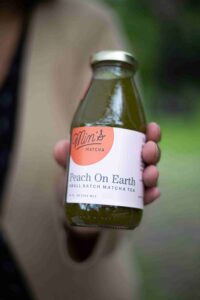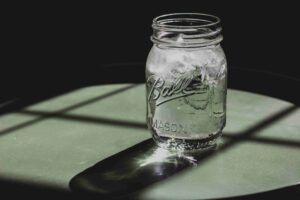What is BPA?
BPA is bisphenol A, an industrial chemical used to make certain plastics and resins since the 1950s.
Both polycarbonate plastics and epoxy resins contain BPA. Polycarbonate plastics are often used to make containers for storing food and drinks (such as water bottles) and can also be used to make other consumer products. Epoxy resins are used as the inner coating of some metal products (such as food cans, bottle caps, and water supply pipes). Some dental sealants and composite materials may also contain BPA.

Figure 1 a big glass jar with biscuits in it
Why is BPA used in some food and drink containers?
BPA is strong, lightweight, and durable. It is now generally used in beverage bottles and canned containers to prevent containers from rusting, thereby extending the shelf life of canned products.
What health problems does BPA cause?
BPA (bisphenol A) interferes with the human endocrine system and affects the hormonal balance in the human body. This interference may cause a series of health problems. First of all, BPA is closely related to reproductive health. People who are exposed to BPA for a long time may be at risk of infertility. If pregnant women are exposed to BPA, it may affect the normal development of the fetus.
Long-term exposure to BPA also increases the risk of cancer, especially hormone-related cancers such as breast cancer and prostate cancer. In addition, BPA is associated with the occurrence of cardiovascular diseases such as high blood pressure and coronary heart disease. In addition, it can cause metabolic disorders and damage the immune system. Therefore, people are paying more and more attention to the risks of BPA and trying to avoid exposure to BPA.
For children, the impact of BPA is particularly significant. Some studies have shown that early exposure to BPA may affect brain development. It will cause children to have some behavioral problems, attention deficits, and learning difficulties.
Overall, the impact of BPA on human health is multifaceted. Thus, more and more people choose to use BPA-free products. For example, the application of glass containers can greatly reduce people’s exposure to this harmful substance.

Figure 2 a woman holdig a glass bottle of juice
Is all glass BPA-free?
Yes, all glass is BPA-free. Glass is a natural inorganic material whose main components are silica sand, soda ash, and limestone. These materials do not produce or release harmful chemicals such as BPA during the manufacturing process. Therefore, glass products, including glass bottles, glass jars, etc., are BPA-free. They are very suitable for use as storage containers for food and drinks.
In addition, glass is chemically inert and will not react with the food or liquid it comes into contact with, making it one of the preferred materials for health and environmental protection.

Figure 3 a batch od clear glass cups
What are the advantages of glass over BPA-free plastic?
Glass offers significant advantages over BPA-free plastics. First, glass is naturally free of harmful substances such as BPA, BPS, or BPF. It does not react chemically with food or beverages, ensuring that the contents are pure and safe. Plastic, while claiming to be BPA-free, can still contain other potentially risky chemicals.
Secondly, glass maintains the original flavor of food and beverages, does not absorb odors, and does not affect the texture of the contents, whereas plastic may affect the flavor at high temperatures or with prolonged use. Glass is a 100% recyclable material that can be reused, which also greatly reduces plastic pollution.
Glass is also highly durable and long-lasting, withstanding extreme temperatures and not easily deformed or damaged. It is easy to clean, not easy to stain, and always stays clean and beautiful. In addition, glass has a higher degree of transparency and texture, giving it a premium feel for display and long-term use.

Figure 4 a mason jar fill with water
If you want to choose safer and more environmentally friendly storage containers, please contact us for professional advice and quality glass containers. Let’s take a healthy and environmentally friendly step together!










